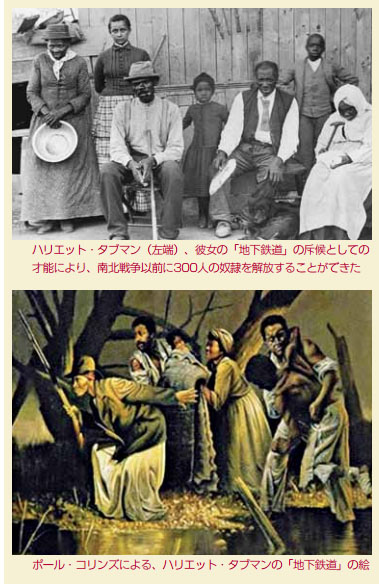国務省出版物
女性実力者の系譜-奴隷制度の鎖を断ち切る「ハリエット・タブマン」
 「地下鉄道」の指導者
「地下鉄道」の指導者
1820年頃生まれ、1913年3月10日死去
メリーランド州ドーチェスター郡で奴隷として生まれたハリエット・タブマンは、勇敢にもペンシルベニア州フィラデルフィアの安全な場所まで走って逃げ込むことにより奴隷制度と決別した、驚くべきアフリカ系米国人の女性である。1850年に逃亡奴隷法が成立して脱走奴隷を助けることが違法になったとき、タブマンは、奴隷を自由にする活動をしている人々の組織である「地下鉄道(Underground Railroad)」に加わる決心をした。
「地下鉄道」は地下にあるわけでもなく、鉄道でもなかったが、極めて抑圧的な南部からの逃げ道として、奴隷制度廃止論者や元奴隷たちが秘密のうちに作り上げた、一連の家、トンネル、抜け道だった。ハリエットはこれらのルートを熟知していたため、一度も捕まらず、また「乗客」を無事に送り届けるのに失敗したこともなかった。
タブマンは、南北戦争に至るまでの年月に、300人の奴隷たちを「地下鉄道」に案内した。タブマンは、奴隷制度がある地域へ19回も危険な旅をした。そのうち1回は、70歳になる自分の両親を救い出してニューヨーク州オーバーンへ連れてくる旅だった。そして、オーバーンは、彼女の故郷にもなった。1860年、集中的に各地を巡る講演旅行を開始し、奴隷制度の廃止だけでなく、女性の権利の再定義をも訴えた。
1861年に南北戦争が勃発すると、彼女は連合軍の看護師、スパイ、斥候として任務にあたった。「地下鉄道」の「車掌」だった時の経験から、地方の事情に詳しかったため、彼女は斥候として特に高く評価された。
戦後、タブマンは政府年金の支給を拒否され、何年間も金銭的に苦しい生活を送った。手続きの非効率性と、おそらくは人種差別が残っていたことが原因だった。しかし彼女は、女性および黒人の地位の向上と、孤児や貧しい高齢者の保護にまい進した。
最終的にタブマンは合衆国陸軍から少額の年金を受け取ったが、彼女はそのほとんどを使って、1908年に、高齢者と貧困者の家として、オーバーンに木造の施設を建てた。彼女はその家で働き、1913年に亡くなるまでの数年間は、彼女自身もそこで世話になった。
*上記の日本語文書は参考のための仮翻訳で、正文は英文です。
Harriet Tubman - American women help the new nation - Women of Influence
(Born: c. 1820; Died: March 10, 1913)
Born a slave in Dorchester County, Maryland, Harriet Tubman was an extraordinary African-American woman who courageously freed herself from slavery by running away to safe haven in Philadelphia , Pennsylvania. In 1850, when the Fugitive Slave Act made it illegal to help a runaway slave, Tubman decided to join the "Underground Railroad," the network of people who helped slaves to their freedom.
The Underground Railroad, neither underground nor a railroad, was an elaborate and secret series of houses, tunnels, and roads set up by abolitionists and former slaves as a way out of the oppressive South. Harriet knew these routes so well that she was never captured and never failed to deliver her "passengers" to safety.
She guided 300 slaves through the Underground Railroad in the years leading up to the Civil War. Tubman made the perilous trip to slave country 19 times. On one trip she rescued her 70-year-old parents, bringing them to Auburn, New York. Auburn became her home, as well. She began an intensive speaking tour in 1860, calling not only for the abolition of slavery, but also for a redefinition of women's rights.
In 1861, when the Civil War began, she served as a nurse, spy, and scout for the Union forces. Well acquainted with the countryside from her days as a "conductor" on the Underground Railroad, she was considered especially valuable as a scout.
Owing to inefficiency and perhaps lingering racial discrimination, Tubman was denied a government pension after the war and struggled financially for many years. She pressed to advance the status of women and blacks, to shelter orphans and elderly poor people. Eventually she did receive a small pension from the U.S. Army, most of which she spent in 1908 to build a wooden structure that served as a home for the aged and needy in Auburn. She worked in that home and was herself cared for in it the last few years before her death in 1913.




